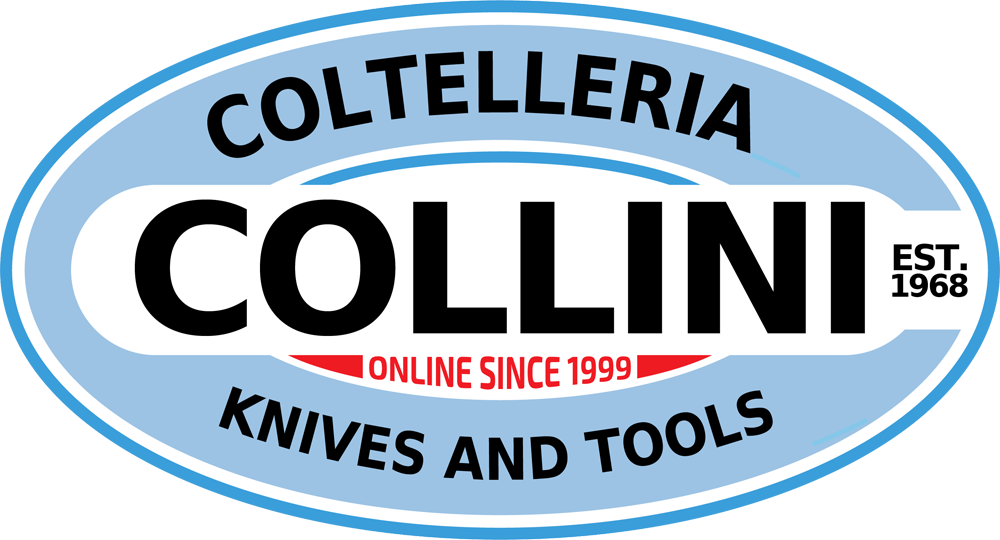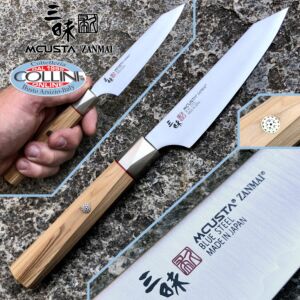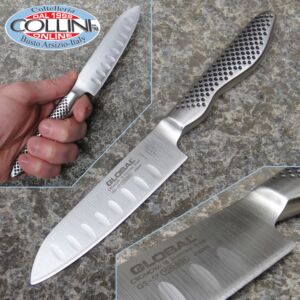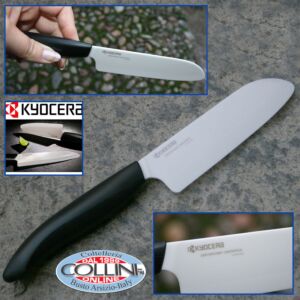Kitchen Knives of Every Kind
-
Mcusta Zanmai - Beyond Utility knife 11cm - Aogami Super steel - ZBX-5001B - kitchen knife
The BEYOND series is the line of top-of-the-range professional knives produced by the Japanese MCUSTA ZANMAI for the year 2020.
The handles of the Beyond series are made of Hinoki wood and traditionally feature a decorative rivet with mosaic. The three-layer blade, with the two external stainless steel and the internal core in Aogami Super carbon (Super Blue Steel) is hardened to 62-63 HRC. Each knife is packaged in a wooden gift box with a bow.Production: Semi-artisanal
Blade: 3-layer steel - stainless steel extrene plates, Aogami Super core (Super Blue carbon steel) from 62-63 HRC
Handle: Hinoki wood
Blade length: 110 mm.
Blade thickness: 2 mm.
Total length: 245 mm
Weight: 80 g.
Note: Not dishwasher safe
Packaging: elegant wooden boxSteel specifications:
Aogami Super (Hitachi Metals Ltd.) is one of the best Japanese carbon. In addition to containing more carbon, chromium and tungsten than Blue Steel, it also includes molybdenum. It has excellent cutting ability and excellent thread retention. Aogami Super is also capable of achieving high hardness without being brittle. Many knife enthusiasts consider Aogami Super to be one of the best high carbon steels in the world.
The city of Seki in Japan has been the center of manufacturing the best Japanese blades since the mid-13th century. Natural choice thanks to its wealth of natural resources: sand, iron, coal and water, all the important elements for the processing of blades. The techniques and skills of the ancient blacksmiths, handed down over the centuries, are currently combined with modern technologies. The city of Seki still remains today the center of production of the best Japanese blades.
Mcusta knives are made in Seki and are the pinnacle of this synthesis between Japanese artisan tradition and modern technology. Each knife is assembled by hand, finished and checked by the craftsmen of the Mcusta team. Mcusta knives are considered among the best in the world!
Coltelleria Collini is the official distributor for Italy of MCUSTA Japanese knives
ZBX-5001B -
Global knives - GS57 - Mini Santoku Knife 11cm - vegetable kitchen knife
Mini Santoku with alveoli, ideal for cutting any food (fish, meat or vegetables).
The blade has grooves that allow excellent cutting smoothness, without the food going
glue to the blade.Blade length: 11cm
Total length: 23 cm
Weight: 82
GLOBAL Japanese knives are the favorite of Chefs in the most prestigious hotels and restaurants in the world.
The first GLOBAL knife was designed in 1985 by Komin Yamada, who gave the knife he created a new and revolutionary design.The main features of GLOBAL knives are:
- Lightness: GLOBAL was the first company in the world to make an empty steel knife in the handle. This feature allows you to reduce the weight of the knife by 30%.
- Manageability: thanks to the lightness and anatomical shape of the handle, GLOBAL knives lend themselves to continuous and prolonged times of use, minimizing user fatigue.
- Wire hold: GLOBAL knives are made using the best steels and the most modern manufacturing techniques. In the blades there is a high percentage of Molybdenum / Vanadium thanks to which the hardness of the steel reaches 56/58 Rockwell of hardness, consequently increasing the life of the wire.
- Sturdiness: being the GLOBAL knives completely in steel (both the handle and the blade) they are practically indestructible.
- Elegance
Awards acquired by GLOBAL knives:1990 - Japanese Good Design by MITI
1991 - Selected for International Design Year Book
1992 - Selected as Best Cooks' Knife in Benelux
1995 - Selected as Best Knife by WHICH Magazine in the UK
1996 - Selected as Sharpest Knife by A LA CARTE Magazine in GermanyAll Global products marketed by us are indelibly screen-printed with the Collini Cutlery logo (as in the image). This marking guarantees the buyer to have certainty on the quality, traceability, guarantee over the years and future privileged assistance on the product purchased from Coltelleria Collini.
GS57 -
Kai Japan - Shun DM-0716 - Paring Knife 110mm - kitchen knives
Shun Classic is one of the flagship lines of the Kai Group (which currently also includes the Kershaw and Zero Tolerance brands), a famous Japanese manufacturer of knives and razors since the early 1900s. This is a series of knives and kitchen accessories suitable for professionals and enthusiasts.
The blades are made of rolled steel consisting of an inner layer of VG-10 stainless steel and two outer cheeks of 32-layer damask. The result is excellent cutting capacity combined with excellent edge retention and good flexibility, which is also guaranteed by the differentiated tempering.
Today, these knives represent the pinnacle of Japanese culinary technology. The quality does not stop with the steel used, however, but continues with the care of the workmanship (sharpening in particular) and the materials used, such as the splendid Pakkawood used for the handles.
Blade: 32-layer Damascus laminate and VG-10 stainless steel
Handle: Black Pakkawood
Blade length: 105 mm.
Blade thickness: 2 mm.
Total length: 220 mm.
Weight: 68 g.
Notes: not dishwasher safeDM-0716 -
Kai Japan - Shun DM-0746 - Wide Chef 110mm - kitchen knives
Kai, Japanese industry partner of Kershaw Knives, has introduced Shun to the market, a series of kitchen knives suitable for lovers and collectors.
Forged from a sheet of VG-10 stainless steel folded and twisted 32 times, to create the typical Damascus design on both sides of the blade. The knife thus has excellent razor cutting capabilities, penetration and edge holding unmatched by any other steel blade.
Currently these knives represent the top of Japanese technology in the culinary field and the quality does not stop only at the steel used, but continues with the care of the workmanship and materials used, such as the splendid black Pakkawood used for the ergonomic handles.
Blade: Damascus 32-layer VG-10 stainless steel
Handle: Black Pakkawood
Blade length: 110mm.
Notes: Not dishwasher safeDM-0746 -
Zwilling - Miyabi 5000FC-D - Shotoh 110mm. 34680-110 - kitchen knife
Production: Japan
Blade: laminate with sharp steel FC61 to 61HRC and damask outer cheeks to 49 layers
Cut: Symmetrical
Construction: Forged
Grip: micarta
Blade length: 110mm.
Recommended use: vegetables, meats,Notes: developed in collaboration with Chef Rokusaburo Michiba
34680-111 -
Kyocera - Ceramica Kyo Fine White - Mini Santoku 11.5 cm - FK-115WH coltello ceramica
Kyocera - Mini Santoku
Questo coltello giapponese con lama in ossido di zirconio di 115mm, si pone a met strada tra un ottimo trinciante per cuochi e un cutter tagliaverdure grazie alla sua lama alta e alle sue eccelse capacita' di taglio e di praticita', conferita anche dalla nuova impugnatura ergonomica antiscivolo.
Uso: Coltello verdure- Lama in ceramica Ishi-Ba nera di 11,5 cm.
- Manico in ABS
Qualità made in Japan dal 1984
Con i coltelli in ceramica Kyocera cucinare diventa puro piacere. Le loro speciali caratteristiche:
- lama in ceramica di zirconia ultra-tagliente, molata a mano
- lama estremamente robusta e resistente alla corrosione
- materiale high-tech con ottima tenuta del filo all'usura
- assoluta precisione di taglio grazie alla superficie liscia e compatta della lama
- massima leggerezza ed estrema praticità grazie al manico ergonomico
I dieci segreti di Ishi-Ba:
* non trasporta gusti ed odori
* è di materiale inerte
* non provoca reazioni chimiche con gli alimenti
* evita sapori sgradevoli di metallo
* non arrugginisce
* non si deteriora
* non ha parti ossidabili
* è facile da lavare, basta sciacquarlo
* è leggerissimo e maneggevole
* rimane perfettamente affilato, anche per anni
L'origine della gestione del Gruppo Kyocera è la filosofia di Kyocera, una filosofia di vita basata sulle esperienze della vita reale e sulle regole empiriche di Kazuo Inamori, fondatore e presidente emerito di Kyocera Corporation. Con la domanda "Qual è la cosa giusta da fare come essere umano?" come criterio principale, la filosofia di Kyocera descrive il significato dell'impegno per una gestione corretta e dell'agire in conformità con i valori umani etici e morali e le norme sociali fondamentali.
PRIMA DI UTILIZZARE IL COLTELLO LEGGA ATTENTAMENTE QUESTE ISTRUZIONI E LE CONSERVI
Questo coltello funzionerà per vari anni senza nessun problema se:
• Lo toglie dal supporto per coltelli o dal cassetto
• Lo utilizza per tagli diritti da eseguire su tagliere
• Lo lava e l'asciuga
• Lo rimette nel supporto per coltelli o nel cassetto dopo averlo utilizzato
USO
Ideale per tagliare frutta, verdure e carni senza osso
Il termine verdure e frutta è generic: non si possono elencare tutti i tipi di frutta o verdura sconsigliati,ma è tassativamente sconsigliato l’utilizzo su frutta e verdura dutra (zucca, noci di cocco, ecc, )
Utilizzi sempre un tagliere di plastica o legno; eviti di tagliare su marmo, pietra, piatti o piastrelle Per trinciare, separare e disossare, così come per tagliare alimenti duri, congelati, pane con crosta e formaggi, utilizzi sempre i suoi coltelli tradizionali in acciaio. Questi tipi di taglio richiedono flessione e torsione e, per questo motivo, conviene utilizzare un materiale più flessibile rispetto alla ceramica.
Per la sua protezione, la punta e la base della lama non sono affilate
PULIZIA
Lavare a mano con acqua e detersivo per piatti.
I coltelli in ceramica Kyocera con manico in plastica possono essere messi in lavastoviglie. Vanno riposti nel vano dedicato a mestoli e piccoli accessori nel cestello superiore, evitando il contatto con altri utensili in metallo. I coltelli in ceramica Kyocera con manico in legno non possono essere lavati in lavastoviglie.
Nel caso si producessero scolorimenti che non scompaiono con la normale pulizia, lavi la lama (non l'impugnatura) con una leggera soluzione a base di candeggina.
EVITARE
Non lasciare cadere su superci dure.
Non utilizzare la punta come punto di rotazione, l'estremità a§lata potrebbe penetrare nel tagliere, bloccarsi e rompersi Non esporre la lama alla amma diretta (la ceramica è un conduttore di calore). Non utilizzare la parte laterale della lama per schiacciare aglio o altri alimenti.
CONSERVAZIONE
Lo collochi in un supporto per coltelli, un fodero o un cassetto. Quando colloca o toglie il coltello dal supporto, faccia attenzione a non danneggiare la punta della lama.
USURA
Con il trascorrere del tempo tutti i coltelli perdono l'a§latura. Un lama di metallo dolce (acciaio inossidabile) "slitta" quando perde l'affilatura. I metalli più duri (come l'acciaio con carbonio) rimangono affilati più tempo, però perdono l'affilatura in modo diverso. I materiali più duri, invece di "slittare", tendono a scheggiarsi leggermente.
All'inizio la ceramica è più affilata - e rimane a§lata per più tempo. Con il trascorrere del tempo possono prodursi delle piccole incisioni sul lo della lama. Si tratta del processo normale per il quale perdono l'a§latura tutte le lame in materiale duro.
Nonostante la loro apparenza, l'esistenza di piccole incisioni non signica necessariamente che il coltello non sia a§lato. Potrà constatare che funziona perfettamente durante un periodo di tempo prolungato.
Quando il rendimento del coltello non sarà più quello desiderato, il processo di a§latura Kyocera farà si che il suo coltello torni ad avere un lama ben affilata.
È possibile che le incisioni più profonde e una punta rotta si possano risolvere grazie alla nuova affilatura.0394 -
Takeshi Saji - Miyabi Hayabusa - custom knife
Takeshi Saji è nato nel 1948 a Takefu (prefettura di Fukui), una città situata all'incirca nel centro del Giappone e nel cuore di una zona da secoli votata alla produzione di lame. Il suo laboratorio è ancora lì, costruito intorno al forno grazie al quale, ormai da parecchi anni, Takeshi Saji forgia l'acciaio (soprattutto damasco) con cui realizza vari modelli di coltelli tradizionali giapponesi. La scelta dei materiali per le finiture (prevalentemente naturali), le linee essenziali - evocatrici dell'utilizzo - e gli accostamenti cromatici di raro impatto rendono le sue realizzazioni uniche e inconfondibili nel panorama della coltelleria mondiale e, in patria, gli sono valse il prestigioso titolo di Maestro.
Destinazione d'uso: Collezione/Sportivo
Tipo di produzione: Artigianale
Produzione Lama: Giappone
Lama: Forgiata a mano, in damasco laminato con tagliente in Hitachi Shirogami a 64HRC
Trattamento Lama: -
Manicatura: Sakura (legno di ciliegio)
Lunghezza lama: 110mm.
Spessore lama: 5mm.
Lunghezza chiuso: -
Lunghezza totale: 215mm.
Spessore da chiuso: -
Bilanciatura: -
Peso: 134g.
Chiusura: -
Clip: -
Fodero: Cuoio e Sakura (legno di ciliegio)
Confezione: Scatola di cartone
Note: interamente realizzati a mano da Takeshi Saji4012














